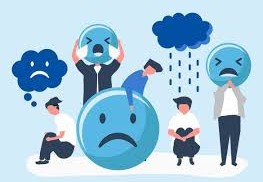Understanding Major Depressive Disorder

What Is Major Depressive Disorder?
Have you ever felt a persistent sadness that refuses to go away, no matter how much you rest or distract yourself?
Major Depressive Disorder (MDD), also known as clinical depression, is more than just feeling sad or having a bad day. It is a serious mental health condition that affects the way a person thinks, feels, and functions daily. It can lead to emotional and physical problems and decreases a person’s ability to function at work and at home.
Key characteristics of MDD:
- Persistent feelings of sadness, emptiness, or hopelessness
- Loss of interest or pleasure in activities once enjoyed
- Changes in appetite and sleep patterns
- Fatigue or loss of energy
- Difficulty concentrating or making decisions
- Thoughts of death or suicide
This disorder doesn’t discriminate. It affects people of all ages, races, and backgrounds, making it one of the leading causes of disability worldwide. The first step toward healing is understanding that depression is a medical condition—not a weakness or personal failure.
Causes and Risk Factors
What leads someone to develop Major Depressive Disorder?
There is no single cause of MDD. Instead, it's the result of a complex combination of genetic, biological, environmental, and psychological factors. Understanding these triggers can help in identifying those at risk and implementing preventative strategies.
Common causes and risk contributors include:
- Genetics: A family history of depression can increase risk
- Brain chemistry: Imbalances in neurotransmitters like serotonin and dopamine
- Trauma or abuse: Especially during childhood
- Chronic medical conditions: Such as diabetes, cancer, or heart disease
- Substance abuse: Alcohol and drugs can trigger or worsen depression
- Major life changes: Including loss, divorce, or job stress
Recognizing these factors early may help in seeking timely treatment and support.
Symptoms and Diagnosis
How can you tell if it’s just sadness or something more serious? The symptoms of Major Depressive Disorder are more intense and last longer than normal sadness. A clinical diagnosis typically requires symptoms to be present most of the day, nearly every day, for at least two weeks.
Diagnostic signs include:
- Emotional: Persistent sadness, irritability, or feelings of worthlessness
- Cognitive: Trouble focusing, indecisiveness, or recurring negative thoughts
- Physical: Sleep disturbances, fatigue, or unexplained aches and pains
- Behavioral: Withdrawal from social activities or a decline in performance
Mental health professionals use tools such as the DSM-5 criteria, clinical interviews, and sometimes blood tests (to rule out other causes) to diagnose MDD properly. Early diagnosis is key to effective treatment.
The Impact on Daily Life
How does Major Depressive Disorder affect everyday living?
Living with MDD can significantly impair a person’s quality of life. It doesn't only affect the person with the disorder—it impacts families, relationships, careers, and overall well-being.
Real-life effects include:
- Social withdrawal:Avoiding friends, family, and social events
- Workplace challenges: Decreased productivity, absenteeism, or job loss
- Strained relationships: Emotional detachment, irritability, or communication breakdown
- Physical health decline: Weakened immune system or worsening of chronic diseases
Depression can turn simple tasks like getting out of bed or taking a shower into overwhelming challenges. It’s essential to acknowledge these effects as real and deserving of compassion and care.
Treatment Options and Support
What can be done to treat Major Depressive Disorder?
Fortunately, MDD is treatable, and a variety of methods exist to help people manage or even overcome it. Treatment often requires a combination of approaches and ongoing support.
Effective treatments include:
- Psychotherapy: Cognitive-behavioral therapy (CBT), interpersonal therapy (IPT), and talk therapy
- Medication: Antidepressants like Lexapro (Escitalopram), which helps balance serotonin levels in the brain
- Lifestyle changes: Regular exercise, healthy eating, and adequate sleep
- Support systems: Talking with loved ones or joining support groups
- Alternative therapies: Mindfulness, meditation, or yoga
Lexapro (Escitalopram) is a commonly prescribed SSRI (selective serotonin reuptake inhibitor) that has shown effectiveness in reducing the symptoms of depression by improving mood and emotional stability. It is generally well-tolerated and may offer relief when combined with therapy and lifestyle adjustments.
How Lexapro (Escitalopram) Can Help
What makes Lexapro a common choice for treating Major Depressive Disorder?
Lexapro (Escitalopram) is one of the most widely prescribed medications for depression. It belongs to a class of drugs known as Selective Serotonin Reuptake Inhibitors (SSRIs). These medications work by increasing levels of serotonin in the brain, a chemical that helps regulate mood and emotions. Low levels of serotonin are often linked to symptoms of depression.
Benefits of Lexapro include:
- Improved mood: Many patients report feeling emotionally balanced after consistent use
- Reduced anxiety: Lexapro also helps ease anxiety, which often accompanies depression
- Few side effects: It is generally well-tolerated with minimal side effects for most users
- Ease of use: Typically taken once daily, with or without food
Like all medications, Lexapro may take a few weeks to show noticeable improvements. It’s important to follow your healthcare provider’s guidance, as dosage and response can vary. Regular check-ins with a doctor help ensure the treatment is working effectively and safely.
Recovery from Major Depressive Disorder is a journey, not a destination. Every person’s path is unique, and what works for one may not work for another. The most important step is reaching out—whether to a friend, a family member, or a mental health professional. With the right help and consistent care, MDD can be managed, and those affected can rediscover a sense of hope, purpose, and joy in life.
Article Post: Editorial Team of RXShop.md
(Updated at May 31 / 2025)

